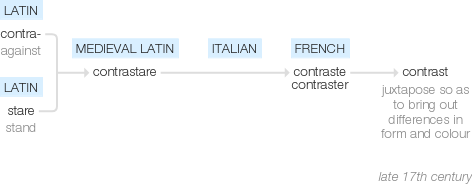Contrast
late 17th century (as a term in fine art, in the sense ‘juxtapose so as to bring out differences in form and colour’): from French contraste (noun), contraster (verb), via Italian from medieval Latin contrastare, from Latin contra- ‘against’ + stare ‘stand’.
wiktionary
From French contraster, from Italian contrastare(“to resist", "to withstand”), from Vulgar Latin*contrāstāre, from Latin contrā(“against”) + stō, stāre(“to stand”)
etymonline
contrast (v.)
1690s, "to set in opposition with a view to show the differences; to stand in opposition or contrast; to set off (each other) by contrast," from French contraster (Old French contrester), modified by or from Italian contrastare "stand out against, strive, contend," from Vulgar Latin *contrastare "to stand opposed to, withstand," from Latin contra "against" (see contra) + stare "to stand," from PIE root *sta- "to stand, make or be firm."
Middle English had contrest "to fight against, to withstand," which became extinct. The modern word is a 17c. re-introduction as a term in fine arts, on the notion of "to exhibit differences or heighten effect by opposition of position, form, color, etc." Related: Contrasted; contrasting; contrastive.
contrast (n.)
1711, "comparison by exhibiting the dissimilar or contrary qualities in the things compared," from contrast (v.). From 1764 as "that which shows striking difference from another when compared to it," also "opposition in respect of certain qualities."
